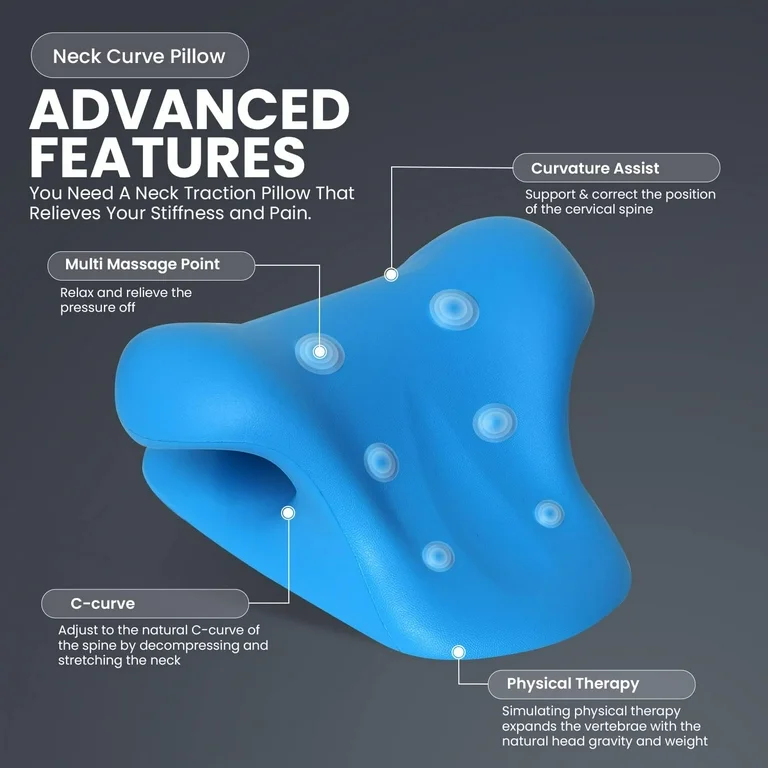Enhance Your Stance and Decrease Neck Discomfort with the Neck Cloud
Enhance Your Stance and Decrease Neck Discomfort with the Neck Cloud
Blog Article
The Impact of Stress on Neck Discomfort: Techniques for Reducing Tension and Pain
In today's busy world, it's no trick that stress has actually come to be a widespread factor in the onset and exacerbation of neck pain. Join us on a journey to decipher the effect of anxiety on neck pain and find efficient methods to ease discomfort and enhance overall quality of life.
Comprehending Stress-Related Neck Pain
Neck pain is a common complaint that can commonly be credited to stress and anxiety. Stress-related neck discomfort can manifest as stress, tightness, or pain in the neck and shoulder area. The connection between stress and anxiety and neck discomfort hinges on the body's physical reaction to stress, which can lead to muscle tension and rigidity in the neck muscular tissues. Chronic tension can cause consistent neck pain and aggravate present problems like cervical spondylosis or muscle mass strains.

Identifying Common Tension Areas
Regularly experienced by individuals under anxiety, tension areas in the body can give important understandings into the physical indications of psychological strain. One typical stress area is the neck, where stress and anxiety typically shows up physically. Stress frustrations, stiff neck muscle mass, and limited variety of movement prevail symptoms of stress-related neck stress. The shoulders are an additional common area where tension gathers. Stress can cause the muscles in the shoulders to tighten, causing pain and pain. Additionally, the upper back is susceptible to stress accumulation, especially in individuals who experience persistent stress. Poor posture and extended sitting can worsen stress around. The jaw is additionally a common location for stress-related tension, as many individuals clench their jaw or grind their teeth when stressed. Understanding these typical tension areas can assist individuals acknowledge the physical indications of anxiety and take actions to resolve them before they intensify right into persistent discomfort or pain.
Implementing Leisure Strategies
Relaxation methods are important devices for reducing neck pain created by stress. Furthermore, tasks like yoga exercise and tai chi incorporate both physical motion and leisure, making them reliable practices for lowering tension and neck discomfort. By including these leisure techniques into your everyday regimen, you can aid manage tension degrees, lower stress in the neck, and reduce discomfort connected with stress-induced neck discomfort.
Including Self-Care Practices
Including self-care practices is vital for preserving total health and handling stress-related neck discomfort properly. Engaging in regular exercise, such as gentle stretching exercises or yoga, can help reduce tension in the neck and shoulders. Practicing great pose throughout the day and taking frequent breaks from prolonged sitting or display time can additionally prevent pressure on the neck muscular tissues.
In addition, focusing on ample rest and developing a constant rest regimen can add dramatically to lowering anxiety degrees and promoting relaxation. Creating Find Out More a relaxing going to bed routine, such as reading a book or taking a cozy bath, can help prepare the mind and body for relaxed sleep. Additionally, maintaining a well balanced diet plan rich in nutrients and remaining moistened can support overall wellness and minimize inflammation that may worsen neck pain.
Incorporating mindfulness techniques, such as deep breathing workouts or meditation, can aid handle tension and promote relaxation. Taking time for oneself, participating my site in pastimes, and setting boundaries to safeguard individual time are additionally important elements of self-care that can add to lowering anxiety and easing neck pain.
Looking For Professional Aid
How can people properly address consistent neck discomfort that is influencing their day-to-day life and health? Seeking expert assistance can be a critical step in managing and minimizing neck discomfort.
Chiropractors specialize in spinal control methods to enhance alignment and minimize stress in the neck location. Physical specialists supply targeted stretches and workouts to reinforce muscular tissues, boost flexibility, and enhance overall neck function. Orthopedic experts can supply sophisticated clinical treatments such as injections or surgical options for severe cases of neck pain.
Conclusion

Stress-related neck discomfort can show up as tension, tightness, or pain in the neck and shoulder area. The connection between tension and neck pain lies in the body's physical feedback to stress, which can result in muscle tension and rigidity in the neck muscular tissues. Stress frustrations, rigid neck muscular tissues, and limited variety of movement are typical symptoms of stress-related neck tension. By incorporating these leisure strategies right into your everyday routine, you can help manage stress and anxiety degrees, reduce stress in the neck, and relieve pain connected with stress-induced neck pain.

Report this page